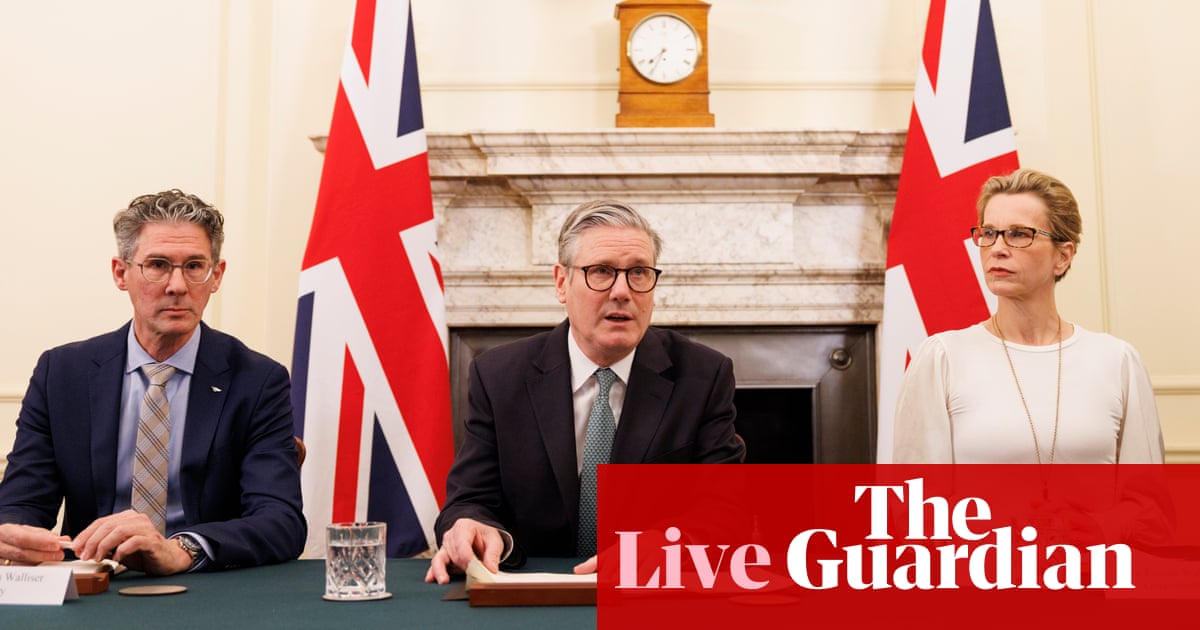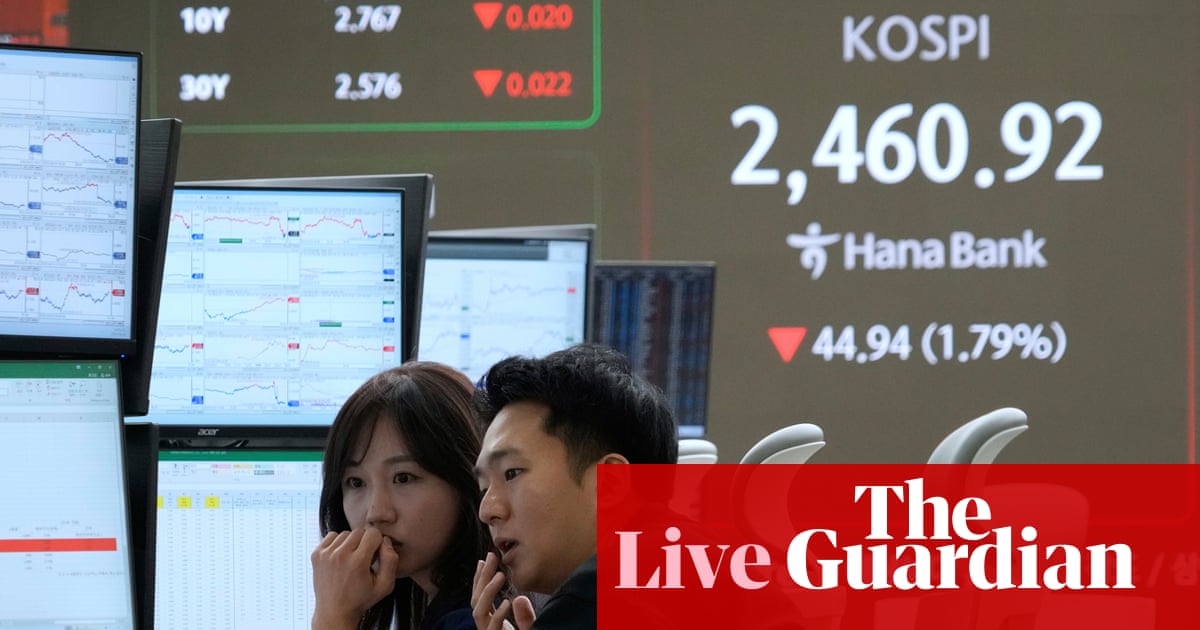Key events Show key events only Please turn on JavaScript to use this feature
Richard Hunter, head of markets at interactive investor, has looked at the outlook for US interest rates, and the moves in UK stock markets.
The US consumer price index is expected later today, where a 0.3% rise is expected in November, annualised to 2.7%, and will be followed by a further reading tomorrow at the wholesale level. Barring any shocks, the likelihood of an interest rate cut is high next week, although expectations have been dialled back on the pace of reductions next year. The twin drivers of a surprisingly robust economy which has shown few signs of heading towards the previously feared recession, alongside some caution that the President elect is likely to introduce some measures which are inflationary, could well keep a lid on the monetary easing path.
In the meantime, the technology stocks which have been at the hub of market strength this year, continue to be in the headlines. Oracle shares dipped by 7% after a disappointing second quarter update, although they remain up by around 70% this year. Alphabet shares are now ahead by 34% in the year to date after a 6% pop in its share price following news that Google had made a major breakthrough in quantum computing power. The influence of mega cap tech stocks is blatantly obvious in the year to date performances, where the Nasdaq has added 31% and the S&P500 26.5%, as compared to a gain of 17% for the more traditional Dow Jones index.
European shares are drifting lower, with the UK’s FTSE 100 down almost 30 points to 8,251, a 0.36% decline. The German, French and Italian markets are flat at the moment. Hunter said:
UK shares also drifted in early trade as any recent year end ebullience has evaporated, at least for the moment. The risk off approach which has permeated investor sentiment has been driven by any number of factors, and the pressure has overspilled to a retailing sector which has increasingly borne the brunt of the potentially damaging measures previously announced in the budget. Both JD Sports and Primark owner Associated British Foods dipped in opening exchanges, with the mining stocks falling again in a sign of investor uncertainty.
The initial decline reduces the performance of the FTSE 100 in the year to date to an increase of 6.7%, with the FTSE 250 having added 6.2% in the same period. While both markets are increasingly accepted to be on extremely cheap valuations compared to global peers let alone historically, investors have continued to seek strong growth returns elsewhere, especially in the US where markets continue to test record highs.
Aarin Chiekrie, equity analyst at Hargreaves Lansdown, has looked at Tui.
Holidaymaker TUI delivered a strong finish to the year as full-year operating profits cruised ahead of market expectations. Consumers continue to prioritise travel, meaning more customers have been willing to pay higher prices to enjoy a break away from everyday life.
TUI owns an airline, cruise ships, hotels and resorts, giving more than 20 million customers the choice of over 180 destinations. In some ways, having a wide package holiday business makes it more defensible – there’s more to offer and a lot of cross-selling opportunities. But the drains on cash when you have planes, huge hotels and cruise ships to maintain and fill are enormous, so it was good to see occupancy rates across the business creep higher. Fewer empty rooms mean more efficiencies and higher profits.
Positive booking momentum continued into the new year too. In the airline segment, 62% of seats for the winter season have already been sold. Debt levels have been brought down to a comfortable level, and continued progress on this front could see dividends reinstated in the near to medium term.
Susannah Streeter, head of money and markets at Hargreaves Lansdown, said:
Investors look set to show wariness ahead of a key inflation report due out in the US, while they await more detail about support for China’s struggling economy. The FTSE 100 is expected to open a little lower, as a wait-and-see mood prevails.
There’s hope in the air for more clues about China’s latest stimulus plan, which is helping lift markets mid-week. The FTSE is set to edge higher in morning trade as the Central Economic Work Conference begins with new targets expected to be laid out.
With the Politburo having announced a looser monetary stance will be adopted next year, investors are holding out for more fiscal support, bigger spending and lower borrowing. While the plans are still likely to be short on detail this week, the economic priorities set by the conference will be seen as an indicator of how far authorities are willing to go to bolster China’s domestic demand, in the face of looming US tariffs which are set to hamper exports.
Interest rate speculation in the United States is set to heighten when a CPI snapshot of inflation is released later, with the signs are that prices have become more stubborn. Although the consumer price index data, due out later, is not the Federal Reserve’s preferred measure of inflation, it still has influence.
If as expected, the headline rate creeps up a little, by 0.1% on the month, it is likely to increase bets of a rate cut next week. Markets are already pricing in a near 85% probability that the Fed will plump for another 0.25% reduction.
Crude oil prices are trading moderately higher this morning, with Brent crude futures up by 0.2% to $72.36 a barrel while US futures are at $68.76 a barrel.
Streeter said:
Oil prices have edged higher as the Israeli forces have attacked Syria’s naval fleet, amid the political vacuum following the collapse of the Assad regime. The uncertainty about what the future holds for the country, and the wider region has raised concerns about crude supplies. Expectations for firmer detail on China’s economic stimulus programme is also raising hopes of higher demand for energy in the world’s second-largest economy. Brent crude is nudging towards $73 a barrel, rising for the third session in a row.
Introduction: Tui bookings rise on demand for package holidays and higher prices
Good morning, and welcome to our rolling coverage of business, the financial markets, and the world economy.
Europe’s largest tour operator Tui has hailed a “very good year” and said both winter and summer bookings are up, as it raised its prices and sold more package holidays.
The Anglo-German firm said 20.3 million people travelled with Tui in 2024, compared with 19 million the year before, and revenues climbed by 12% to €23.2bn. Underlying profits rose by a third to €1.3bn from €977m. Profit is expected to rise by between 7% and 10% next year.
Winter bookings have risen by 4% year on year with 62% of holidays sold. Tui raised its prices by 5% and sold more package holidays and dynamically packaged trips, where travellers can book individual components with dynamic pricing.
People have been booking more packaged holidays as they try to control costs amid inflationary pressures, but are still keen to get away. Airlines have been hit more by rising costs and weaker business bookings, but Tui’s holiday business has thrived.
Summer bookings are 7% ahead of last year and Tui has sold 17% of those holidays, similar to this time last year, with prices up by 3%.
Tui said demand remained robust throughout the year despite strong competition, but there was a decline in customers going on long-haul trips in the Netherlands and Belgium.
Sebastian Ebel, the chief executive, said:
We will continue to focus on package holidays and our good cooperation with travel agencies.
It’s US inflation day, and financial markets are on tenterhooks.
We are expecting the annual rate of the consumer prices index to tick up to 2.7% from 2.6%, while the core measure, which strips out volatile items like food and energy, is forecast to have stayed at 3.3%.
The Agenda
-
1.30pm GMT: US inflation for November (forecast: 2.7%; previous: 2.6%)
-
2.45pm GMT: Bank of Canada interest rate decision

.png) 3 months ago
28
3 months ago
28













































